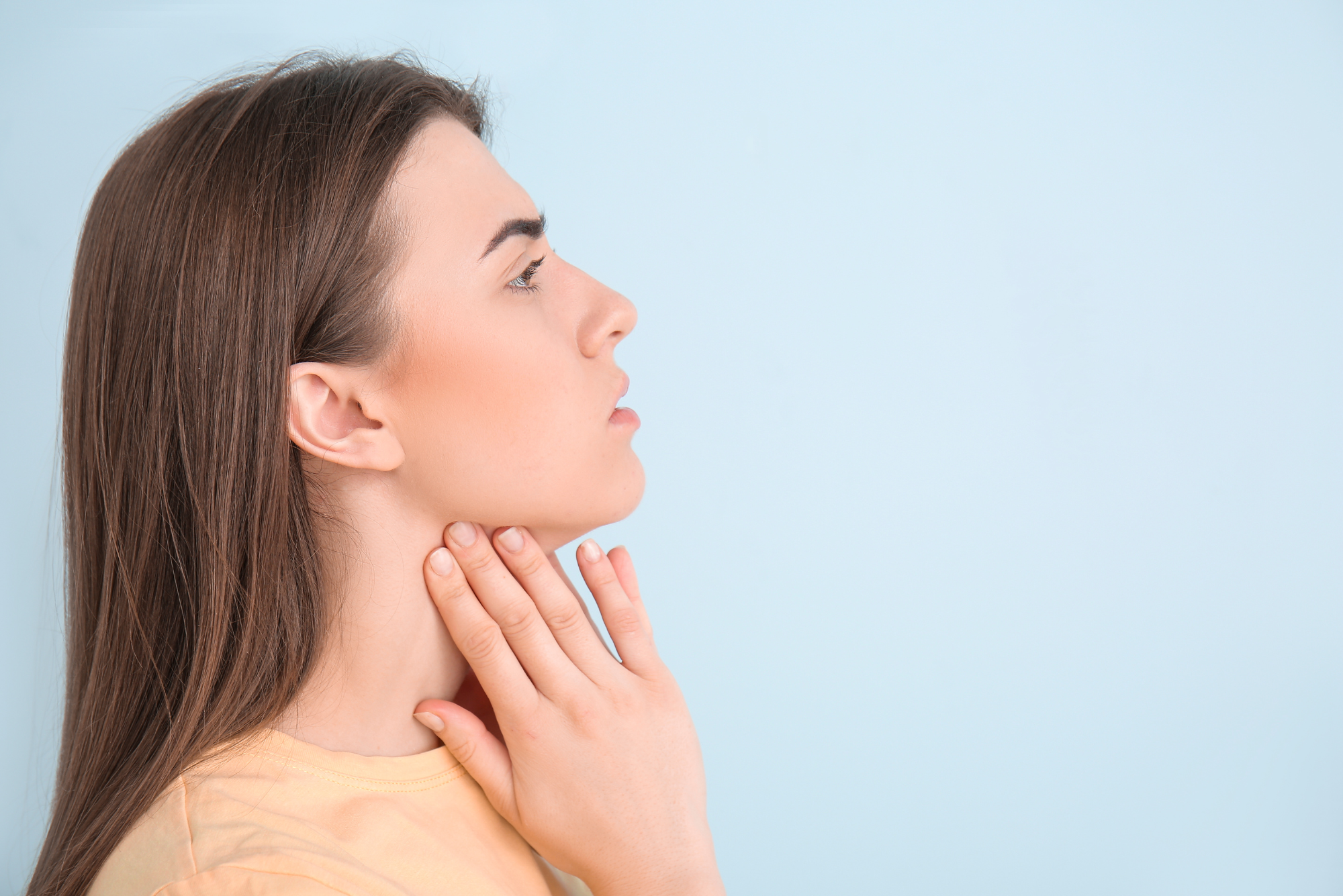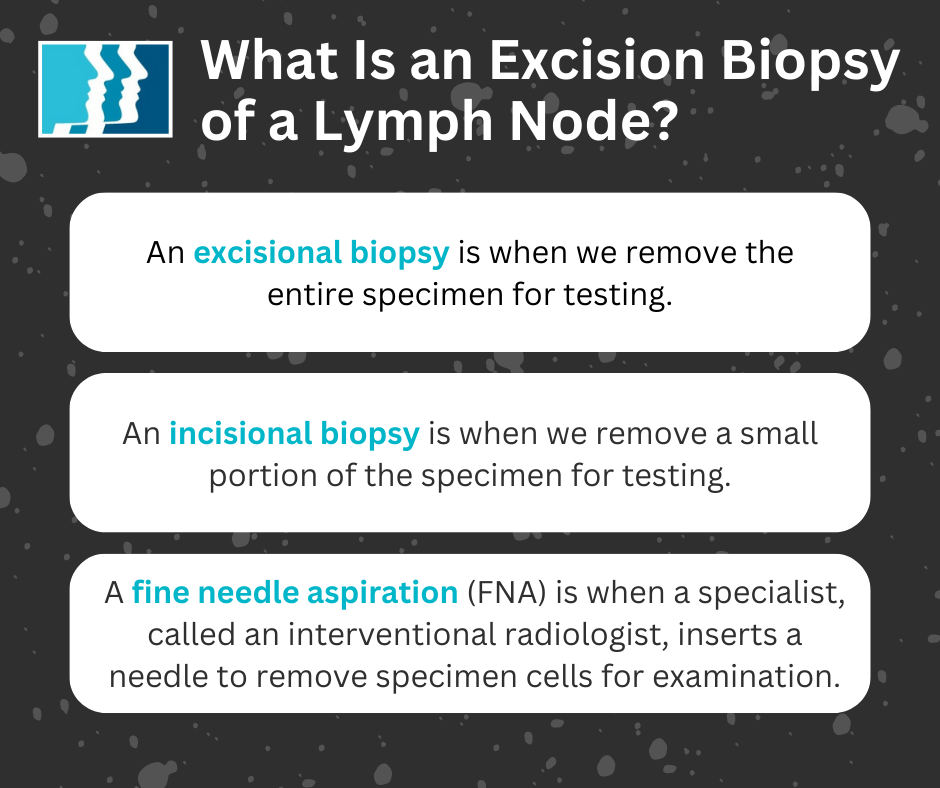Excision Biopsy of a Lymph Node: Everything You Need to Know

If you’ve had an enlarged lymph node for some time and it’s not responding to antibiotics or steroids, it may be time to investigate the issue further. In this case, we might recommend something called an excision biopsy of the lymph node.
It’s normal to feel anxious about any surgical procedure, including a biopsy. To help ease your nerves, we’re sharing everything you need to know about a lymph node excision biopsy below.
What Is an Excision Biopsy of a Lymph Node?
Before we get into the specifics, it’s helpful to know the different types of biopsies:
- An excisional biopsy is when we remove the entire specimen for testing.
- An incisional biopsy is when we remove a small portion of the specimen for testing.
- A fine needle aspiration (FNA) is when a specialist, called an interventional radiologist, inserts a needle to remove specimen cells for examination, often called a needle biopsy.
In the case of lymph nodes, incisional biopsies are rare unless a very large mass is present. Sometimes, an FNA can give us enough information to make an accurate diagnosis. Far more often, though, an excision biopsy of the lymph node is the procedure that provides us with the data we need for a definitive diagnosis.
To identify certain illnesses, such as lymphoma, certain other cancers, or a low-grade tuberculosis infection, we need to examine more than just a few cells; we need to see the entire lymph node. An excision biopsy gives us that ability, which leads to a more accurate diagnosis and better treatment for the patient.

What to Expect From an Excision Biopsy of Your Lymph Node
How to Prepare
An excisional biopsy isn’t a complex procedure, and you don’t have to do much prep work. You can make sure you’re ready for the operation by following these basic tips:
- Keep in communication with our office. At the time your surgery is scheduled or shortly thereafter, you will be given some instructions from our office staff about the procedure details and estimated cost. A day or two before your surgery, you will receive a phone call from our office AND a phone call from the surgery center. Please make sure to answer BOTH phone calls as this will provide important information about your procedure.
- Remember to fast before your surgery. Avoid drinking or eating anything after midnight the day before your surgery. This makes general anesthesia much safer.
- If you have a large beard, please shave it. We’ll need unobstructed access to your neck for the biopsy, so plan to shave two to three days before your surgery. (Important note: Please do not shave the day before your surgery. Shaving can create microscopic cuts in your skin that allow bacteria in, which could lead to infection.)
- Shower with antibacterial soap. Cleaning your body with antibacterial soap will reduce the number of germs on your skin and lower your risk of infection after surgery.
- Arrive on time. We always prefer that our patients arrive on time or a little early for their scheduled surgery. Arriving stressed and in a hurry only adds to any pre-surgery anxiety!
During the Procedure
When you arrive at the surgery center on the day of the procedure, the medical team will guide you to the pre-operative area, take your vitals, and prepare you for the operation.
We perform excision biopsies of the lymph node under general anesthesia, and it’s a very straightforward procedure:
- We make a small incision in the neck over the target lymph node.
- We dissect the tissue around and adjacent to the lymph node so we can remove it entirely, being very careful not to damage any surrounding nerves.
- Once the lymph node is out, we close the incision in layers, using plastic surgery techniques to ensure it heals nicely. We use absorbable sutures, so they dissolve on their own without you needing to return to the office to remove them.
- If the lymph node or the space left behind is very large, we leave a small rubber drain in the area to prevent fluid from collecting there.
- We apply Steri-Strips bandages over the incision site to keep it tightly closed.
- After the surgery, we send the specimen to a pathologist, who examines and tests it for signs of disease.
The surgery usually takes about 30–60 minutes, depending on the location and size of the lymph node. Once the procedure is over and you’ve woken from anesthesia, you can head home the same day.
Recovery
Recovery from an excision biopsy of the lymph node does not usually involve much pain, though we still prescribe pain medication for after the procedure in case you need it. Most people only experience some soreness around the surgery site. Depending on the person, ice packs may be enough to help with the discomfort.
Some people report a mild sore throat after being intubated for general anesthesia, which resolves within a few days.
If you had a drain placed in the surgery site, we’ll ask you to come back to the clinic the day after surgery so we can remove it. Otherwise, we’ll schedule a follow-up visit for a week or so after surgery, during which we’ll remove the Steri-Strips and check the incision to ensure it’s healing well.
You can shower 24 hours after surgery, and it’s okay to get the incision site wet while you’re in there. Avoid strong water pressure pointing directly onto the incision site and gently wash with soap and water. You can pat it dry with a towel afterward. You will want to avoid completely submerging the incision underwater, like in the bathtub or swimming pool, until after you are completely healed.
We also recommend taking it easy for a week. Light activity is fine, but avoid strenuous exercise and heavy lifting so you don’t accidentally rupture a blood vessel we tied off during surgery.
Feel free to eat whatever you’d like after your surgery, as long as it’s comfortable for you. There’s no need to follow any specific diet while recovering from an excision biopsy of a lymph node, but keep in mind you may have a sore throat for a day or two afterwards.
Final Thoughts on Excision Biopsies of Lymph Nodes
It’s never fun to be told you need surgery, but if you have a suspicious lymph node, an excision biopsy can give you some extremely important information. If it reveals an illness, it also reveals the way to treat that illness so you can get back to living your life — without a swollen or painful lymph node getting in the way.
Dr. Cuthbertson is a physician at Ear Nose & Throat Associates of Lubbock. He joined the team at ENT Lubbock from Houston, where he was chief resident of the prestigious Bobby R. Alford Department of Otolaryngology at Baylor College of Medicine. He is board certified in Otolaryngology and Head & Neck Surgery and has quickly built a reputation, not only as an extremely skilled surgeon, but as an approachable and compassionate clinician adept in the newest standards and technologies. Learn more about Dr. Cuthbertson.
Categories:








